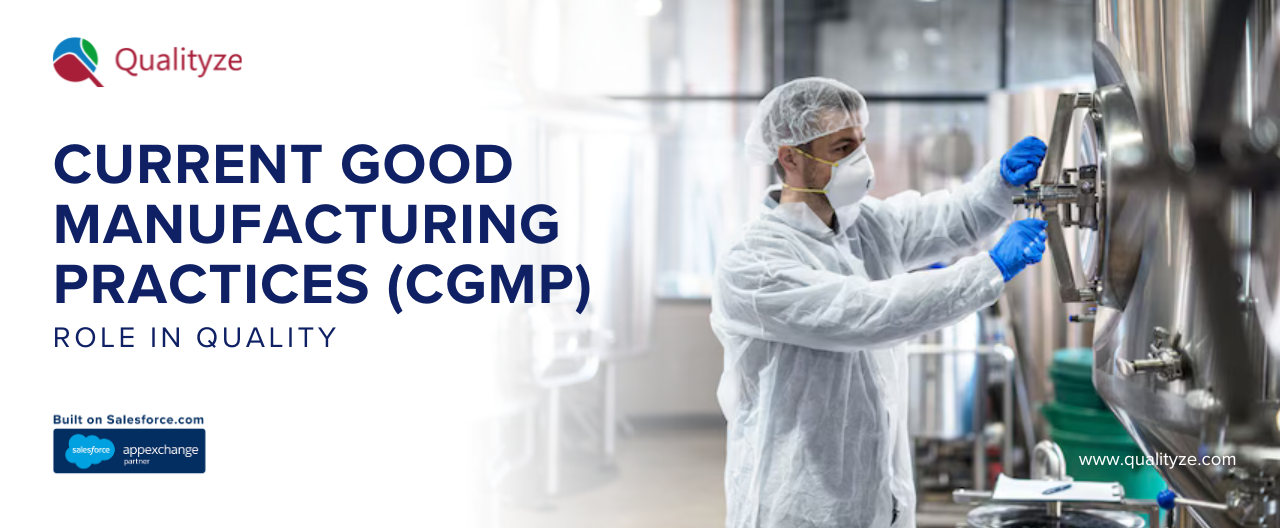

Calculate your potential savings with our ROI Calculator
ROI Calculator
Quality in Manufacturing is critical. It assumes critical significance, especially when producing products that impact public health and safety. Current Good Manufacturing Practices (hereinafter cGMP) are essential in ensuring that products meet high quality, safety, and consistency standards.
cGMP guidelines are regulations enforced by authorities to guarantee that manufacturers adhere to strict protocols during production. The role of cGMP is particularly significant in industries like pharmaceuticals, food, cosmetics, and medical devices, where safety and effectiveness are non-negotiable. Adhering to cGMP ensures product integrity and builds consumer trust and regulatory compliance.
Implementing cGMP can significantly reduce the risks of product recalls, contamination, and non-compliance penalties. Manufacturers must have well-documented procedures, maintain clean facilities, and monitor and validate every aspect of production.
This blog shines a bright light on the role of cGMP in quality, its significance, and its application across different industries.
cGMP practices are designed to minimize the risks involved in production that cannot be eliminated through testing the final product. cGMP applies to all aspects of production, including raw materials, equipment, facilities, personnel, and the final product.
In quality control, cGMP is a framework for controlling and maintaining product quality throughout manufacturing. For example, it mandates that companies implement specific procedures to prevent contamination, ensure accurate labelling, and guarantee consistency in the final product. cGMP also requires manufacturers to perform routine inspections and testing, verifying that products meet the specifications. Moreover, the system emphasizes traceability and record-keeping, essential for verifying the quality of processes and products.
cGMP is critical in ensuring quality by creating a structured environment where quality is integral to the manufacturing process. Manufacturers are encouraged to take a proactive approach, focusing on preventive measures rather than relying solely on post-production testing.
The FDA enforces cGMP regulations in the United States. These regulations cover various industries, including pharmaceuticals, biologics, food, and medical devices. The FDA’s cGMP regulations ensure that these products are consistently produced and controlled to meet quality standards.
In the pharmaceutical industry, FDA cGMP regulations dictate the minimum facility, equipment, and personnel requirements. For example, manufacturers must demonstrate that their facilities can produce drugs that meet their intended specifications. It includes maintaining proper environmental conditions such as temperature, humidity, and cleanliness. The regulations also emphasize the importance of employee training, ensuring that those responsible for production and quality control are competent.
Another significant aspect of FDA cGMP regulations is documentation. The FDA mandates that manufacturers maintain comprehensive records of all production activities. Comprehensive documentation includes batch records, inspection logs, and testing results. Such documentation provides a trail of evidence in case of regulatory audits or product recalls.
While both cGMP and GMP refer to manufacturing standards, there is a key difference between the cGMP and GMP. GMP, or Good Manufacturing Practices, refers to a general set of guidelines and practices that ensure the manufacturing process is consistent and controlled. However, cGMP includes the word “current,” signifying that these practices must be continuously updated and aligned with the latest technological advancements and regulatory requirements.
The inclusion of “current” in cGMP underscores the need for manufacturers to adopt new innovations, techniques, and best practices as they become available. It ensures production processes remain up-to-date, reducing the risks of quality issues and non-compliance. GMP, in contrast, does not emphasize the continuous update of practices and may be seen as a more static set of guidelines.
In short, cGMP is a dynamic and evolving set of standards, whereas GMP refers to more traditional practices that are not necessarily subject to the same level of change.
In the pharmaceutical industry, cGMP ensures that drugs and medications are produced with the utmost care for quality, safety, and efficacy. cGMP guidelines in Pharma focus on minimizing risks related to contamination, mix-ups, and errors during production. These regulations cover everything from the raw materials used in drug production to the final packaging of the product.
The pharmaceutical industry must adhere to strict standards to meet cGMP requirements. Facilities must maintain a sterile environment, and personnel must undergo regular training to follow the necessary protocols. Equipment used in production must be regularly calibrated and maintained to ensure its proper functioning. Qualityze’s EQMS Suite of Calibration Management and Maintenance Management software are enabler of uninterrupted quality. Its cutting-edge features, such as Automated Calibration Scheduling, Automated Periodic Maintenance Scheduling, automatically schedule calibration tasks or maintenance tasks based on time intervals or usage, reducing manual oversight and ensuring compliance.
It offers other benefits like:
cGMP also requires pharmaceutical companies to conduct rigorous testing at every production stage, including raw materials, in-process samples, and the final product to ensure it meets the specified standards. All of this is documented thoroughly, ensuring traceability in case any issues arise.
The application of cGMP in Pharmaceuticals guarantees the safety and efficacy of medications and builds consumer trust by ensuring high-quality drugs.
In the broader manufacturing context, cGMP refers to the practices and standards that ensure products are consistently produced and controlled to meet specific quality standards. cGMP applies to various industries, including food, cosmetics, and medical devices.
Manufacturers must implement rigorous protocols for cleanliness, equipment maintenance, and personnel training. For example, a food manufacturer must maintain hygienic conditions in its production facility to prevent product contamination. Similarly, a cosmetic manufacturer must ensure that all ingredients used are safe for consumer use and that the final product meets all relevant regulations.
For manufacturers in all industries, adherence to cGMP also involves implementing quality control systems that test products at various stages of production. It includes testing raw materials, in-process samples, and finished products to meet the required specifications.
These measures ensure that consumers receive safe, effective, and high-quality products.
Compliance with cGMP is essential for the following reasons:
It ensures that products are safe and meet all regulatory standards. It is particularly important in industries like pharmaceuticals, where the stakes are high, and any lapse in quality can have severe health consequences.
cGMP compliance helps companies avoid regulatory penalties, product recalls, and potential lawsuits. Failure to adhere to cGMP standards can result in significant financial losses and damage a company’s reputation.
cGMP promotes a culture of continuous improvement. By following the regulations and keeping processes up-to-date, manufacturers can adapt to new technologies, industry trends, and customer demands. Adaptability is crucial for maintaining competitive advantages and ensuring long-term success.
One of the critical aspects of cGMP is documentation. Manufacturers must maintain comprehensive records of all activities, processes, and tests performed during production. Documentation indicates compliance with cGMP regulations and helps ensure product quality.
Documentation involves recording information on raw materials, production batches, equipment maintenance, and personnel training. The detailed record-keeping allows manufacturers to trace the production process from start to finish. In the event of a product recall or regulatory audit, these records can help identify the source of any issues.
cGMP requires that manufacturers have a well-documented system for handling complaints, returns, and product recalls.
Qualityze Document Management software enables companies to achieve objectives set by the FDA and other regulatory bodies. The Qualityze DMS is a one-off document solution that adapts to ever-changing regulatory requirements in the pharmaceutical and other critical industries. Qualityze's Quality Management Software of Complaint Management, Adverse Event Reporting, and Field Safety & Recall Management systems offer a comprehensive solution for managing customer complaints, product safety issues, and recalls efficiently.
cGMP plays an integral role in ensuring product quality, safety, and efficacy across various industries. It provides a structured framework for manufacturers to follow, emphasizing consistency and precision throughout production. The importance of cGMP in industries like pharmaceuticals, food, and cosmetics cannot be overstated. It protects consumers and helps businesses stay compliant with regulatory requirements and avoid costly mistakes.
Adhering to cGMP standards is an ongoing process that requires manufacturers to maintain detailed records, implement rigorous testing, and continuously improve their practices. By doing so, manufacturers can maintain high product quality and safeguard public health.
Author

Qualityze Editorial is the unified voice of Qualityze, sharing expert insights on quality excellence, regulatory compliance, and enterprise digitalization. Backed by deep industry expertise, our content empowers life sciences and regulated organizations to navigate complex regulations, optimize quality systems, and achieve operational excellence.